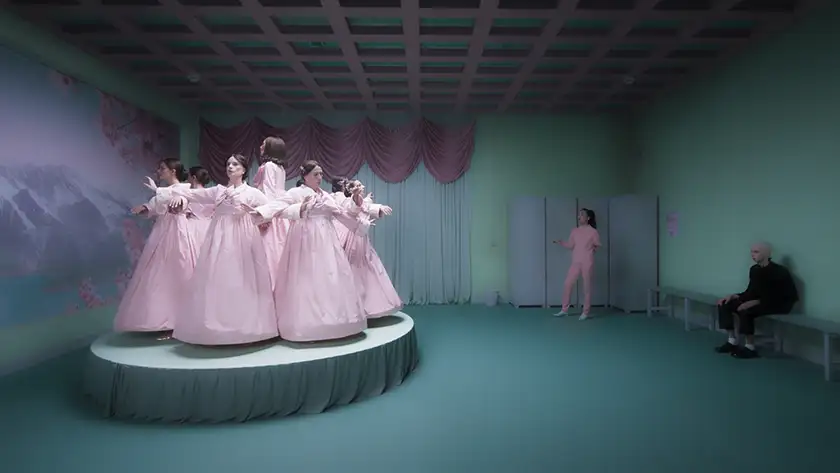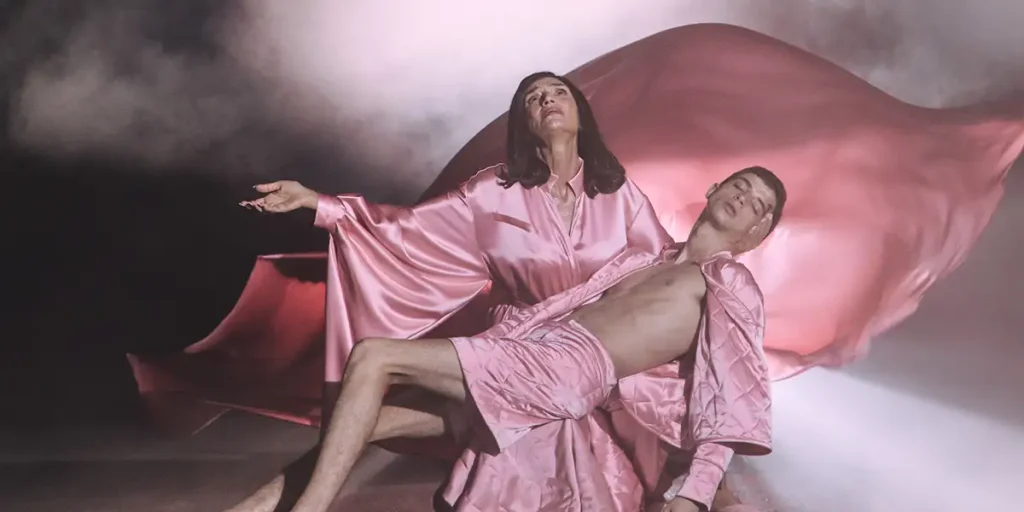La Pietà is a surreal film depicting a pink dystopia in which the toxic relationship between a mother and her son is taken to the extreme.
Writer & Director: Eduardo Casanova
Genre: Drama, Horror, Fantasy
Run Time: 80′
U.S. Release: January 17, 2025
U.K. Release: TBA
Where to Watch: on VOD and on streaming channel Film Movement Plus
It’s impossible to start the conversation about La Pietà in any way that doesn’t immediately touch on the visual style of the film. It’s such a striking and singular-looking movie; anyone familiar with director Eduardo Casanova and his previous work should be able to guess what I’m referring to here. This movie is so, so pink. But not the bright and happy Barbie pink. More the slightly uncomfortable and sickening pink of the flesh. But more about that later.
La Pietà is about Mateo (Manel Llunell), who lives with his mother, Libertad (Ángela Molina) and can’t imagine a life without her. Despite being a young adult already, he’s entirely dependent on his mom, to the point that he can’t even sleep without her, and leaving the house by himself is basically not an option. Years of grooming have made sure that she’s his entire life. But Mateo wants more than that, and Libertad can sense it too.
One day Mateo is diagnosed with cancer. His mother, in her desperation, claims the cancer is caused by his desire to distance himself from her. In her eyes, it’s as if it was a divine punishment for Mateo’s disobedience against his maker. But this diagnosis weirdly threatens to grant him his independence for once. He has to go through the treatments alone; a psychologist is appointed to the family by the doctors who intend to help Mateo with his manipulative mother and the blatant power imbalance at home, and the medicine puts him into a lurid state which causes hallucinations that unironically help him see clearer in the face of his mother’s lies.
At the same time, it turns Mateo’s reliance on his mother, which was previously nothing more than a psychological construct put into his head through a life of manipulation, into a very real physiological fact. His body is weakened by the treatment and he needs someone to take care of him; that person is, of course, his mom, who feeds him, bathes him, and makes sure he takes his medicine. And despite clear warnings from the doctor regarding side effects, Libertad is curious to know what might happen if Mateo were to take more medicine than prescribed.
And so a struggle for independence begins as mother Libertad continues to manipulate Mateo, trying to keep him securely within her grasp, while he starts to see potential for a world beyond her reach for the first time. In essence, she’s her own kind of dictator, ruling this house with an iron fist and dealing out unfair punishments, while simultaneously insisting on regular showcases of love in return. At least that’s the comparison the movie would like to make, by… stitching a subplot set in North Korea into the story?

North Korea is repeatedly brought up throughout the movie. Occasionally our protagonists will hear stories about the North Korean dictatorship on TV, and at times we even cut away from our messed-up little family unit to meet a different family unit living under an actual dictator. They don’t take up much of the runtime, but they mirror the main plot in clear ways, and in little time manage to tell a messed-up little story. But this North Korean subplot encapsulates La Pietà’s two major issues.
Firstly, Eduardo Casanova is interested in a very surreal and abstract type of storytelling that relies on effective use of symbolism to convey its themes and certain story beats. But it’s so heavy-handed here. To convey the idea that the mother might share characteristics with that of a dictator, not only does the film add an entire North Korean subplot that has no other connection to the story, but it also literally has characters compare her to a dictator towards the end. There are many other examples like it (the extreme highlighting of exit signs and doors in the first third to convey that Mateo wants to leave comes to mind) that would have benefitted from a more subtle approach, allowing the audience to be enthralled by a slightly more unknowing psychodrama.
The second problem is the emotional distance to the characters. Awful things happen to the North Korean family, but we don’t know these people. We don’t develop much of a feeling for the main cast either, despite spending much more time with them. It’s one of the dangers of a surreal and off-kilter style like the one utilized here, and in this case it does not pay off. There’s too much artificial distance between us and the characters to get truly invested in their struggles, and the film does rely on a number of emotional beats in its story.
But before we end, let me return to the striking visuals once more. The entire film looks like your classic dystopia, with sterile and symmetrical environments, formal clothing, and a color palette limited to white, black, grays, and pink. So much pink. An uncomfortable pink that weirdly doesn’t make the movie any more colorful. Pair this with the occasional moment of body horror, which are admittedly very gross, and you can’t help but think about vulnerable human flesh when you see the color pink. Mateo and Libertad’s home, where much of the movie takes place, even combines the pink color with a marble texture creating an image reminiscent of the inside of a human body.
So the sets are meticulously designed, and there are some striking shots in La Pietà too, but a singular visual style can’t save a sloppily told story whose emotional stakes are hard to get a grip on. After watching La Pietà, it’s clear that Eduardo Casanova is an interesting filmmaker who could have a promising future ahead of him, but this is not the film that will convince me that he’s a great filmmaker.
La Pietà: Movie Plot & Recap
Synopsis:
Mateo’s life revolves entirely around his mother to the point that he’s scared to even leave the house without her. When he’s diagnosed with cancer an opportunity arises to escape her tight grip for the first time in his life. But mother Libertad knows what to say to keep him in her clutches.
Pros:
- striking visual style
- moments of body horror are suitably gross
Cons:
- painfully on the nose uses of symbolism
- too much distance between viewer and the characters makes emotional involvement difficult
- North Korean subplot has no place in the story
La Pietà will be released on VOD and on the streaming channel Film Movement Plus on January 17, 2025.

